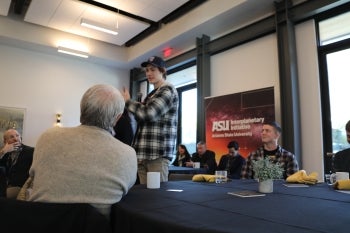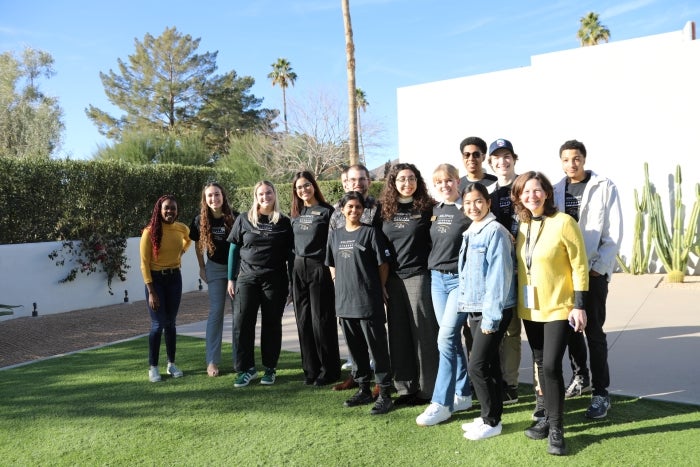Space experts help ASU Space Student Ambassadors see their futures among the stars

ASU Space Student Ambassadors pose with space industry leaders, including Cady Coleman (first row, far left), U.S. astronaut, Kim Macharia (first row, second from left), executive director at Space Prize Foundation, and Asaad Abdul-Hamid (second row, far left), a doctoral student studying how to manage orbital debris. Photo courtesy Interplanetary Initiative
By Adrianna Nine
What kind of influence does science fiction have on scientific fact? What can humans realistically achieve in the field of space exploration? And what role do students play in all of this?
These questions and more were answered by prominent experts and leaders from across the space industry at the Arizona State University Interplanetary Initiative's annual Space Futures Convening held earlier this month at the Andaz Scottsdale Resort.
The three-day event brought together industry professionals and students, providing a unique opportunity for discussion and collaboration. On the final day of the convening, the 17 members of the 2023–24 ASU Space Student Ambassador cohort were invited to ask experts for their perspectives on sector challenges, career growth and more in an open, “ask-me-anything” style seminar.
Gabriella Nakleh, a junior majoring in aerospace engineering, looked to the future by asking experts which “dreams for humanity’s future in space” students might be able to help achieve within the next five to 15 years. Hiro Ono, leader of the Robotic Surface Mobility Group at NASA’s Jet Propulsion Laboratory (JPL), emphasized the importance of meaningful scientific exploration in remote places, like on icy moons and under the surface of Mars. In a similar vein, JPL flight systems engineer Tracy Drain expressed interest in far-off planets’ atmospheres.
“There are a truly outrageous number of planets in our galaxy,” Drain said. “I hope we can use spectroscopy to determine what those planets’ atmospheres are made of. It’d be game-changing for humanity to have more tangible knowledge regarding what’s out there.”
Lindy Elkins-Tanton, vice president of the Interplanetary Initiative and a foundation and Regents Professor at ASU’s School of Earth and Space Exploration, reminded students of their inherent strength and influence. “There’s this sense that students aren’t yet fully powerful in the world, that you’re just starting,” she said. “You are never anonymous and you are never powerless. You have so much more power than you realize, and you should wield it in a way to make the world you want. Space gives us the power to imagine society as it should be.”
Lucas Barduson, a senior studying aerospace engineering, asked experts how science fiction has influenced their careers — and how the genre could influence scientific fact, particularly as it relates to space activity. Mary-Jane Rubenstein, professor of religion and science at Wesleyan University and author of the book "Astrotopia," suggested that reading science fiction by a diverse range of authors could offer a slew of perspectives, whether cautionary or inspiring. “If we’re thinking about exploring space differently, more sustainably, multilaterally, inclusively — then the voices of folks who have been on the underside of earthly development are really important,” Rubenstein said. “That’s what’s so cool about science fiction, that it breaks the boundaries of what we think is possible.”
Following the conclusion of the interview, student ambassadors were provided time to network and chat with convening experts about their career experiences and gather insight relevant to their work with the Interplanetary Initiative and Space at ASU. Over the next semester, ambassadors will brainstorm ways to impart their newfound advice and inspiration to other students at ASU in order to galvanize their interest in and involvement with space. In one such case, Nakleh and fellow ambassador Kylie Wetnight, a senior studying business global politics, are set to appear on Daniel Fox’s "Future of Space" podcast.
The event at the annual Space Futures Convening is just one example of an opportunity afforded to ASU Space Student Ambassadors. Throughout the year, members of this competitive undergraduate leadership and professional development program enjoy access to exclusive conferences, networking opportunities and the lasting benefits of a tight-knit, interdisciplinary group. Those interested in applying for a future cohort are invited to learn more about the program — and peripheral opportunities — via Space at ASU. Applications for the 2024–25 cohort open in March.
More Science and technology

ASU researcher part of team discovering ways to fight drug-resistant bacteria
A new study published in the Science Advances journal featuring Arizona State University researchers has found vulnerabilities in certain strains of bacteria that are antibiotic resistant, just…

ASU student researchers get early, hands-on experience in engineering research
Using computer science to aid endangered species reintroduction, enhance software engineering education and improve semiconductor material performance are just some of the ways Arizona State…

ASU professor honored with prestigious award for being a cybersecurity trailblazer
At first, he thought it was a drill.On Sept. 11, 2001, Gail-Joon Ahn sat in a conference room in Fort Meade, Maryland. The cybersecurity researcher was part of a group that had been invited…

